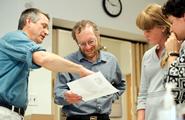
The world is definitely warming, and it is directly due to factors that human beings have caused—these are two things that Dr. Richard Alley is certain of, and the premises on which he based his Oct. 20 lecture in the Taylor Science Center’s Kennedy Auditorium. Dr. Alley, a glaciologist and professor of geosciences at Penn State University, spoke as a guest of the Geosciences Department and Environmental Studies Program on present state and future implications of sea-level rise due to a warming planet. Alley was a member of the UN climate change committee that was awarded the 2007 Nobel Peace Prize.
Alley considers it an indisputable scientific fact that sea levels are rising, and there are several reasons why. Greenhouse gases like methane and carbon dioxide that have accumulated in the atmosphere serve as a global blanket, insulating the earth by reflecting radiation back at the surface. Mountain glaciers in ranges like the Alps and Himalayas are melting into runoff; thirsty communities in arid climates are tapping huge groundwater reserves which, after irrigating crops, run into ocean waters which are already swelling under thermal expansion. None of these factors compare in degree, though, to the enormous volumes of water melting from glaciers at the North and South Poles.
Glacial melting, which could normally be expected to proceed at a slow rate given the changing atmospheric conditions, has been aggravated by several factors. Massive lakes that form from melted snow atop large glaciers in Greenland and Antarctica force fractures in the ice apart, allowing water to permeate down through up to two miles of ice to the underlying bedrock. The water thaws and lubricates the bedrock, accelerating glacial melting at an exponential rate—once it starts, explained Alley, the melting spreads quickly as the glacier is carved out from the bottom.
Large, continuous blocks of ice, like that covering Antarctica, are reliant on buttressing as a means of structural reinforcement. Alley likened a glacier to a two-mile high pile of snow. Highest in the center, the ice pushes out at the sides, attempting to expand laterally (you see the same tendency in a pile of anything, for instance sand). The ice expands and much of the pressure is absorbed by outcroppings of bedrock, such that enormous towers of ice between outcroppings are left suspended over the ocean. Melting around the natural buttresses has caused enormous, unsupported columns of ice, miles high, to drop off at once. Once the buttressed areas are gone, melting accelerates, and the entire glacier retreats inland.
Scientists have been studying climate change long enough, now, to see that many of their predictions have come true. This, says Alley, should lead people to realize that bleak predictions for future melting are not sensationalized, but are true to reality. He says that economists, when faced with the issue, have tended to brush off worries and make one of two predictions. Either it won’t be as bad as climatologists are predicting, or it will be as bad, but we will deal with problems as they arise. Alley is skeptical of our ability to deal with crises, even when they are expected, and pointed to Hurricane Katrina as an example of a not unexpected disaster that was incapable of being dealt with after the fact.
Conscious not to leave the audience with worries of impending sea-level rise and irreversible global climate change, Alley emphasized that the future of the world is not written in stone. The problems he raised are not unsolvable, he said, and it is only a matter of acknowledging the serious implications of our passivity before real legislation can be enacted to counteract the damage we have already done.
Alley dispelled any assumptions that he might want to be the one make policy decisions regarding climate change and a sustainable future. Scientists, he said, are best suited for science, but he does think that scientific information should be considered an invaluable tool in assessing legislative goals and the efficiency of current policies. It’s up to everyone, he said, to decide in what way to respond to the impending crisis—but a responsible decision involves a recognition of the power and privilege we have been afforded and a consideration for the generations that will inherit the world we leave.
Posted October 21, 2011
